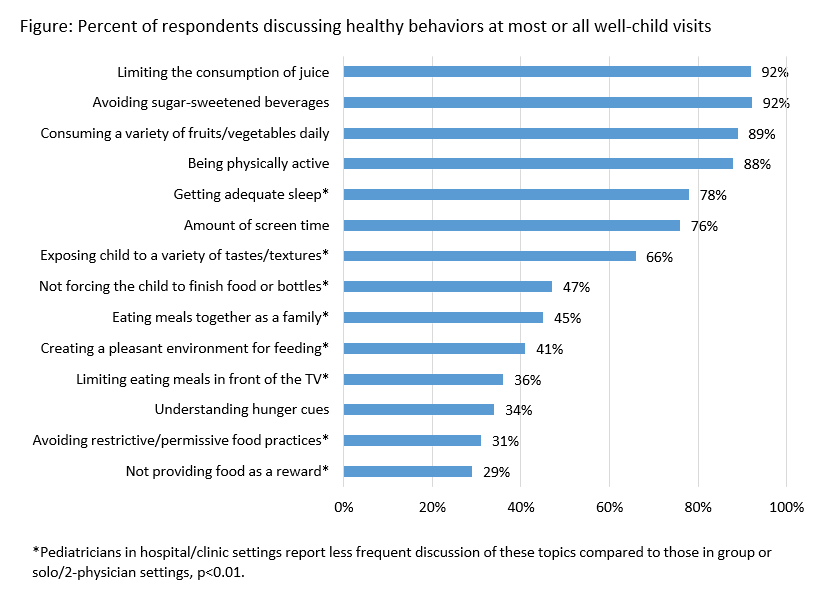Ellen O. Boundy1,2, Amanda Fisher3, Janice L. Liebhart4, Heather C. Hamner2, Mary Pat Frintner3, Jeanne Lindros4
1Epidemic Intelligence Service, Centers for Disease Control and Prevention; 2Division of Nutrition, Physical Activity, and Obesity, National Center for Chronic Disease Prevention and Health Promotion, Centers for Disease Control and Prevention; 3American Academy of Pediatrics, Department of Research; 4American Academy of Pediatrics, Institute for Healthy Childhood Weight
Presented at the 2018 Pediatric Academic Societies Annual Meeting
Background: The American Academy of Pediatrics (AAP) recommendations related to growth and nutrition for children aged 0-2 years include use of World Health Organization (WHO) growth charts, exclusive breastfeeding for 6 months, solid food introduction around 6 months, continued breastfeeding for ≥12 months, and providing guidance to parents on nutrition-related topics.
Objective: Assess pediatricians’ practices related to nutrition, feeding, and growth for children aged 0-2 years.
Methods: The Periodic Survey, a national random sample of AAP US members, focused on obesity in 2017 (response rate=50%). The analytic sample included practicing pediatricians and residents providing health supervision (n=704). Respondents were asked about their early nutrition practices and recommendations. Descriptive statistics examined use of WHO growth charts, recommendations for breastfeeding and solid food introduction, and discussion of healthy behaviors. McNemar tests compared responses for introduction of different solid foods earlier than 6 months, and chi-square tests examined differences in responses by practice setting.
Results: Most respondents (85%) use WHO growth charts at most or every well visit for children <2y. Exclusive breastfeeding is recommended for 6 months by 41% of respondents; 19% recommend any breastfeeding for ≥12 months and 70% for as long as mutually desired by mother and baby. Solid food introduction is recommended at 6 months by 45% of respondents; 48% recommend earlier introduction and 7% recommend later introduction. Among those who advise solid food introduction <6 months, baby cereals are recommended more often than fruits/vegetables or meats (p<0.01). Healthy behavior topics most frequently discussed with parents are limiting juice (92%) and avoiding sugar-sweetened beverages (92%), while avoiding restrictive/permissive practices around food (31%) and not providing food as a reward (29%) are least frequently discussed. Pediatricians in hospital/clinic settings discussed healthy behaviors less often than those in group or solo/2-physician practices (p<0.01) for 8 of 14 topics examined.
Conclusion: For children 0-2 years, most pediatricians use WHO growth charts and discuss healthy eating behaviors with parents, while fewer discuss responsive feeding behaviors. Provision of guidance in line with recommendations on breastfeeding and solid food introduction is more mixed. Continued efforts to support pediatricians’ work related to early nutrition, feeding, and growth are needed.

Last Updated
10/15/2021
Source
American Academy of Pediatrics